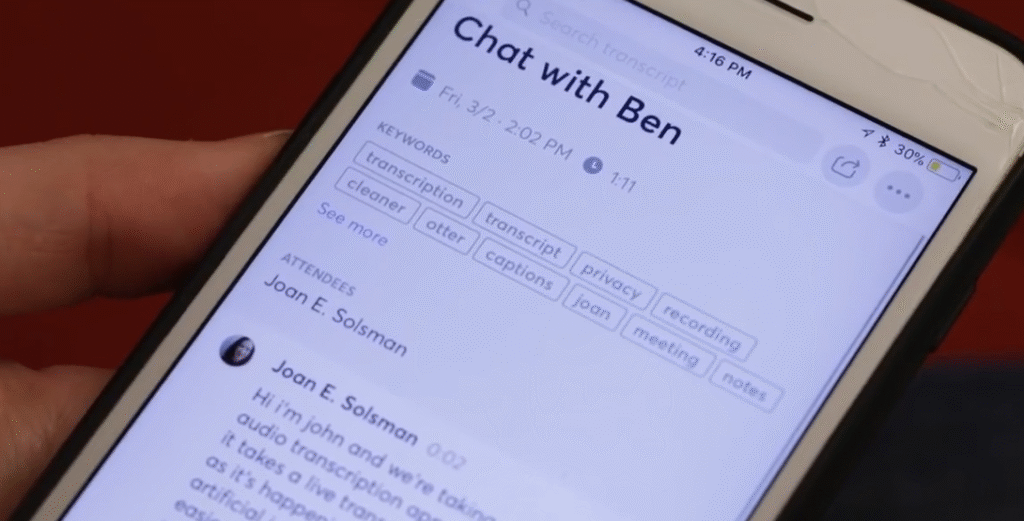The Otter.ai case has sparked a heated debate about responsibility, privacy, and the fundamentals of digital trust in contemporary business. According to the California class action lawsuit, Otter Notetaker, the company’s flagship tool, secretly recorded private meetings and conversations without getting everyone’s consent. The claims are remarkably similar to previous scandals involving Siri, Alexa, and other voice technologies accused of violating privacy boundaries, which is surprising for a platform hailed as an immensely flexible productivity enhancer.
The complaint claims that Justin Brewer took part in a Zoom call in February 2025 during which Otter’s Notetaker joined by default. He says he had no idea his words were being recorded, saved, and possibly used as input for Otter’s machine-learning models. He also never subscribed to the service and never granted permission. According to the lawsuit, this act violates California’s extremely stringent consent laws in addition to federal privacy protections. Otter is alleged to have successfully outsourced compliance by placing the onus of consent on users rather than accepting accountability for it.
The timing is particularly noteworthy because, only months prior to the lawsuit, Otter proudly announced that its annual recurring revenue had surpassed $100 million. The case now compels the industry as a whole to consider whether AI firms can keep growing at a dizzying rate without giving transparency the same priority. The answer is becoming very evident to many observers: trust needs to be developed with the same level of care as technology.
Key Facts – Otter AI Lawsuit
| Category | Details |
|---|---|
| Company | Otter.ai, Inc. |
| Founded | 2016, Mountain View, California |
| Industry | AI-Powered Transcription & Meeting Tools |
| Core Product | Otter Notetaker (real-time meeting transcription) |
| Lawsuit Filed | August 15, 2025 |
| Court | U.S. District Court, Northern District of California |
| Plaintiff | Justin Brewer (on behalf of class participants) |
| Allegations | Recording without consent, training AI on conversations, shifting responsibility to users |
| Laws Cited | ECPA, CIPA, CFAA, Unfair Competition Law |
| Website | Otter.ai |

Otter’s use of “de-identification” is among the most controversial details. In order to enhance its transcription models, the business requires that training data be anonymized. However, privacy advocates argue that true anonymity is practically impossible due to contextual details, linguistic style, and speech patterns. Even “scrubbed” data can frequently be re-identified with startling accuracy, according to research. Such risks are especially concerning when employees and clients are discussing sensitive topics, such as personal health or legal strategies.
It’s difficult to overlook the similarities to Apple’s 2025 settlement over Siri. Apple acknowledged that contractors had examined unintentional Siri recordings, some of which contained extremely private conversations. Amazon was also criticized for Alexa. Both businesses were forced to restructure their consent procedures. Despite being unique, the Otter case feels strikingly similar, highlighting a recurrent pattern in which speed and convenience are valued over privacy until the courts or public outcry demand change.
This case highlights a well-known tension from a societal standpoint. AI assistants have become commonplace in remote work, helping with tasks like note transcription and action item summarization. Unquestionably useful, these tools frequently significantly lessen administrative burdens. However, the very characteristics that make them so effective also reveal weaknesses. Silent recording runs the risk of turning meetings into data-gathering sessions, which can damage confidence among clients, employees, and employers.
Celebrity worries about improper use of AI only make the problem worse. Scarlett Johansson’s objection to the use of a voice that she thought was remarkably similar to her own demonstrated how hazy the lines separating consent have become. Concerns regarding AI transparency have been voiced by Elon Musk in public. Their well-publicized demonstrations support the concerns that are currently at the heart of the Otter debate: What safeguards are in place for regular professionals whose remarks might unintentionally feed corporate algorithms if well-known voices can be recorded or mimicked?
Companies are already adjusting as well. Businesses are being advised by law firms and compliance specialists to establish explicit consent procedures each time a notetaker attends a meeting. Organizations can avoid reputational risks and still reap the benefits of AI efficiencies by implementing more stringent internal policies. Some of Otter’s competitors, such as Read.ai, are taking proactive measures to allay these worries by enabling anyone, not just the host, to refuse or halt recording. Otter’s strategy appears noticeably out of date and possibly purposefully opaque in light of this contrast.
The issue of data retention is also emphasized in the lawsuit. Critics are worried about conversations being preserved for years because Otter’s policy allegedly permits the company to store information indefinitely “as long as necessary.” The extent of exposure seems incredibly large, especially when you consider that millions of Americans may have had their voices recorded without their knowledge. The financial ramifications of statutory damages could be substantial enough to completely alter the market for AI notetakers.
This moment serves as a reminder to consumers of how quickly digital tools are changing everyday life. Most people wouldn’t have thought that a routine staff meeting could raise such important issues regarding privacy rights just a few years ago. However, the Otter lawsuit now represents changing expectations: that clarity must be enforced, that consent should not be taken for granted, and that innovation cannot outpace accountability indefinitely.
The prospect of reform is the source of hope. It may be especially advantageous for society as a whole if Otter and similar businesses are forced to implement incredibly robust privacy safeguards. By allowing technology to continue being both extremely effective and morally sound, transparency in AI systems has the potential to increase trust rather than erode it.

